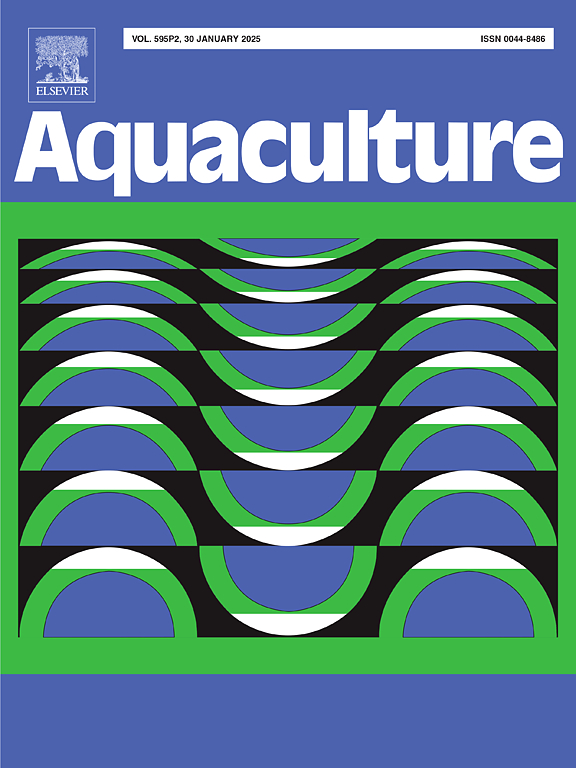从barramundi副产物中提取的发酵鱼粉可促进南美对虾(Penaeus vannamei)的生长、免疫和肠道微生物群
IF 3.9
1区 农林科学
Q1 FISHERIES
引用次数: 0
摘要
本研究探讨了barramundi、Lates calcarifer和副产物鱼粉对南美对虾生长、免疫和肠道菌群的影响。评估了三种变体:未经处理的鱼粉(BFM),酶解鱼粉(EBFM)和发酵鱼粉(FBFM),以及商业鱼粉对照。与商品鱼粉相比,梭鲈副鱼粉的粗蛋白质含量较低,但脂肪和灰分含量较高。植物乳杆菌7-40发酵显著提高了FBFM中蛋氨酸水平。饲粮中添加EBFM或FBFM的对虾增重、饲料效率和生物量显著提高,其中FBFM的提高最为显著。补充FBFM还可以增强免疫参数,包括酚氧化酶、呼吸爆发、超氧化物歧化酶、溶菌酶和吞噬活性,以及免疫相关基因的上调。FBFM组抗溶藻弧菌攻毒后存活率最高。肠道菌群分析显示,在fbfm喂养的虾中,弧菌丰度降低,有益菌(如肠球菌、Rubritalea)增加。主成分分析表明,不同处理的微生物分布不同。这些结果表明,FBFM是一种可行的替代蛋白质来源,可以改善虾的生长、免疫力、肠道健康和抗病性,支持循环经济框架下水产饲料的可持续发展。本文章由计算机程序翻译,如有差异,请以英文原文为准。
Fermented fish meal derived from barramundi by-product enhances growth, immunity, and gut microbiota in white shrimp Penaeus vannamei
This study investigated the effects of barramundi, Lates calcarifer, by-product fish meals on the growth, immunity, and gut microbiota of white shrimp, Penaeus vannamei. Three variants were assessed: untreated fish meal (BFM), enzymatically hydrolyzed fish meal (EBFM), and fermented fish meal (FBFM), alongside a commercial fish meal control. Compared to commercial fish meal, barramundi by-product meals exhibited lower crude protein but higher lipid and ash contents. Fermentation with Lactobacillus plantarum 7–40 notably increased methionine levels in FBFM. Shrimp fed diets containing EBFM or FBFM showed significantly greater weight gain, feed efficiency, and biomass production, with FBFM yielding the most pronounced improvements. FBFM supplementation also enhanced immune parameters, including phenoloxidase, respiratory burst, superoxide dismutase, lysozyme, and phagocytic activities, alongside upregulation of immune-related genes. Post-challenge survival against Vibrio alginolyticus was highest in the FBFM group. Gut microbiota analysis revealed reduced Vibrio abundance and increased beneficial genera (e.g., Enterococcus, Rubritalea) in FBFM-fed shrimp. Principal component analysis indicated distinct microbial profiles among treatments. These results highlight FBFM as a viable alternative protein source that improves shrimp growth, immunity, gut health, and disease resistance, supporting sustainable aquafeed development within a circular economy framework.
求助全文
通过发布文献求助,成功后即可免费获取论文全文。
去求助
来源期刊

Aquaculture
农林科学-海洋与淡水生物学
CiteScore
8.60
自引率
17.80%
发文量
1246
审稿时长
56 days
期刊介绍:
Aquaculture is an international journal for the exploration, improvement and management of all freshwater and marine food resources. It publishes novel and innovative research of world-wide interest on farming of aquatic organisms, which includes finfish, mollusks, crustaceans and aquatic plants for human consumption. Research on ornamentals is not a focus of the Journal. Aquaculture only publishes papers with a clear relevance to improving aquaculture practices or a potential application.
 求助内容:
求助内容: 应助结果提醒方式:
应助结果提醒方式:


